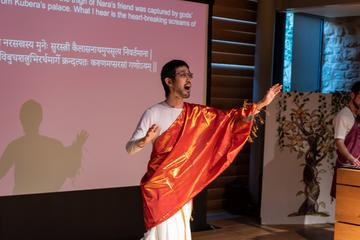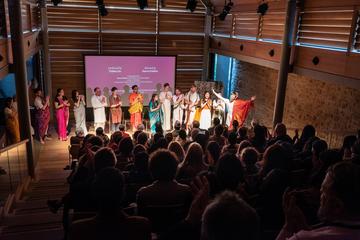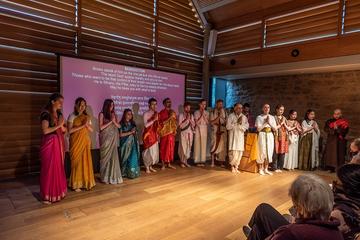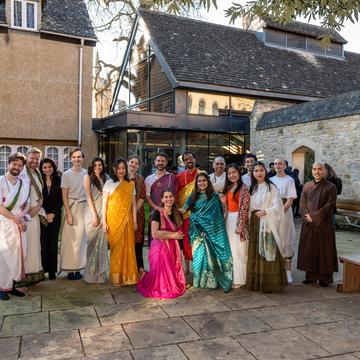A Sanskrit Play in Sanskrit: The Vikramorvaśīyam – Reflections from project lead, Yizhou Liu
The project, A Sanskrit Play in Sanskrit: The Vikramorvaśīyam, (translation: How Urvashi Was Won) was supported by the Humanities Cultural Programme powered by TORCH in collaboration with the Faculty of the Oriental Studies and The Queen's College, just like the first Sanskrit play The Middle One performed in 2020.
How Urvashi Was Won relates the story of King Pururavas, a mortal, and his love for a celestial dancer named Urvashi. Shulman and Rao, in the introduction to their translation, write that 'the tragic love of this asymmetrical couple was already described in the ancient Rig Veda (circa BC 15th -10th century). The fifth-century Kalidasa, universally acknowledged as the most celebrated Sanskrit poet, has reworked the narrative and turned the well-known story into a masterpiece of lyricism, subtle characterization, and the working through of a bold theme'.
The Sanskrit subject group at the Faculty of Oriental Studies regularly offers one or two Sanskrit plays for a reading class every year. The idea of a Sanskrit play in Sanskrit was conceived from some banter among the second-year students in the dimly lit, yet strangely cosy corridor at the Oriental Institute. We, the students, thought it was such a shame that the play-reading class, which should have been 'play-ful', had become a linguistic autopsy exercise, while the dense emotion and peculiar sense of humour between the lines slipped away. Only the enactment of a Sanskrit play would allow us to practise spoken Sanskrit, and to appreciate the fine literature in its complete form. The enjoyable journey 'from page to stage' thus started. Shree Nahata, a DPhil student at Balliol College, who played a major character, says 'I had a fantastic time practising my Sanskrit lines with fellow cast members. The grammatical perfection and beauty of the Sanskrit language on paper was brought to colourful life on stage'.
Sanskrit, as an Indo-European language, bears close affinity with languages such as Ancient Greek, Lithuanian, and even English. (The name Theo-dore is cognate with Deva-datta, a popular name in Sanskrit literature; and both mean 'god-given'.) As Sheldon Pollock puts it elegantly, Sanskrit is not only a 'language of the gods'--being the vehicular language of Hinduism, Jainism, and Buddhism--but also, it lives in the 'world of men'. Although Sanskrit probably ceased to be anyone's mother tongue somewhere in the first millennium, it has since even more firmly dominated the learned discourse, perhaps well into the period of colonisation. Beyond the transmission of the sacred corpus as the divine language, Sanskrit has seen the most fascinating anthologies of narrative and epic literature, such as the Mahabharata, and a wide range of works in all learned subjects, from the so-called 'six schools' of philosophy to royal elephantology, from highly sophisticated grammar to recipe books and of course, the much-misunderstood Book of Love. But Sanskrit, as a non-Western, non-modern language, is being forgotten in this fast-racing world. The history of the building of the Old Indian Institute is an uncanny metaphor for the fate of Sanskrit studies in Oxford. Standing opposite the Sheldonian, the much-photographed building once accommodated the most ambitious plan in the learning and literature of India and Sanskrit; it now houses a cutting-edge interdisciplinary institute to find solutions to the most pressing global issues. While the University must leverage its resources to answer questions that are urgent and challenging, the study of Sanskrit--like all other subjects in the humanities--raises questions about us that are equally critical.
A Sanskrit performance, by challenging ourselves by speaking Sanskrit and acting the dead language out, also challenges the audience to confront another world with different structures of normativity and different textures of imagination, yet the audience would soon realise that they are simply experiencing a déjà vu of this modern world. Our Sanskrit play, indeed, points to a subset of common human struggles: the power of love, love in separation, the question of divine intention and intervention, conflicts of one's duties to one's lovers, family, and country, and to the gods. We wish to open up our classroom studies of the ancient scripts, to preserve the ancient performative traditions, and to accentuate the value of humanities research and the commitment to our common future, through the most accessible medium--a Sanskrit play in Sanskrit (with English subtitles). And it is for this reason that we reached out to the Humanities Cultural Project to increase our visibility and impact.
More than half of the Oxford Sanskritists, including two standing faculty members, had to play a role for the fantastic reason that there are too few of us. The Queen's College gladly offered their wonderful auditorium and, together with the Faculty, organised many outreach activities for the three schools--two of them among the few that teach Sanskrit in the world outside India--that have visited us. It allows us to experiment with new ways to engage with the general public. We find it a particularly unifying experience among the cast member, who are from four continents and eight countries, and a unifying experience for the audience. Shree reflects, 'acting in the play was a great way of experiencing Sanskrit as a living language open to people of all religions, "castes", ages, and nations'.
Thanks to TORCH's support, our video clips of the Sanskrit play have been uploaded to the website as our commitment to reach out to the general public in the broadest sense. The HCP has offered us sufficient funding, hands-on coaching on project management, and online visibility. Yijo, a second-time producer of the Sanskrit play, speaks about the Humanities Cultural Programme, 'I think, most importantly, the HCP sends out a powerful message that the University, beyond its consistent investment in the academic excellence of the humanities, also invites dialogues among the academia, the prospective students, the current students, and the general public'. Dr John Lowe, who co-ordinated the school visits and also acted as our departmental supervisor, says 'the enthusiasm and dedication of our students in putting on this play, and the practical and financial support of the Queen's College and the HCP, not only resulted in a beautiful piece of theatre, but also provided a clear demonstration of the vitality and richness of Sanskrit studies to those beyond our subject and beyond our university'.
As the director of the play, and an experienced actress in multiple Sanskrit plays around the world, Poorva Palekar, a first-year student in MPhil Classical Indian Religions, says, 'it was an amazing experience to perform in a Sanskrit play with participants from all over the world. I am immensely joyful that I could use my previous experience to stage a Sanskrit play at Oxford. I believe it was such a success because of the passion and curiosity everyone has for the language. The Oxford Sanskrit Plays are small but constructive contributions towards the greater relevance of the ancient language to the modern world'. And it is in this spirit, that we hope to stage another Sanskrit play next academic year.
The Sanskrit play 2022 was attended by over 100 guests with some travelling from London. The hour-long performance was accompanied with English subtitles and some gentle humour after an introductory talk given by Dr Victor D'Avella in the Shulman Auditorium at the Queen's College on 7 March 2022.
To find out more about this project please visit: https://torch.ox.ac.uk/the-second-oxford-sanskrit-play-how-urvashi-was-won







